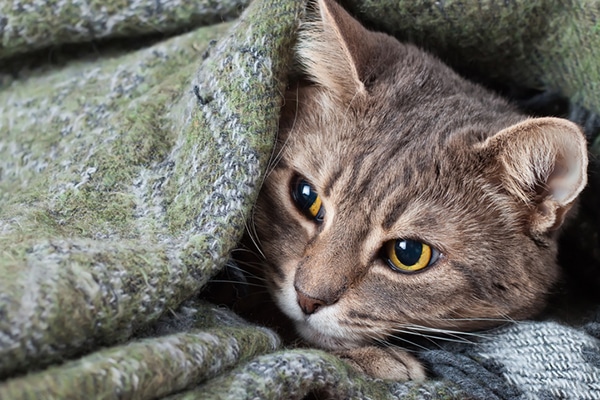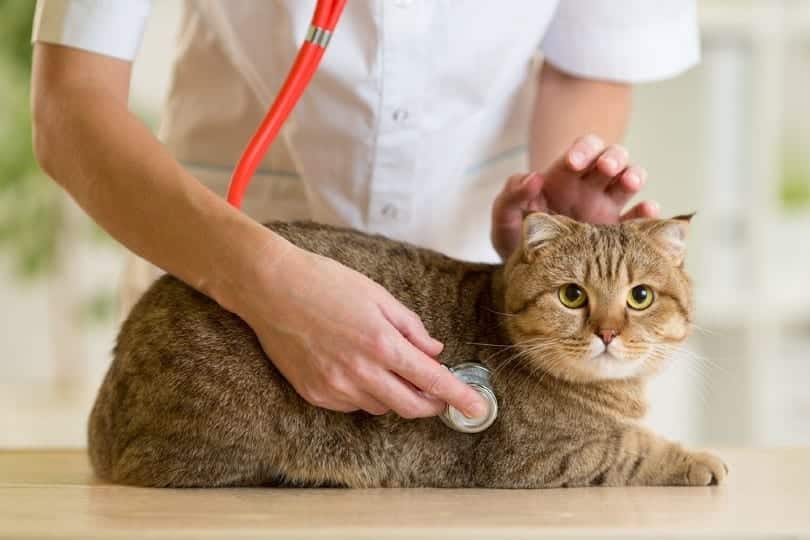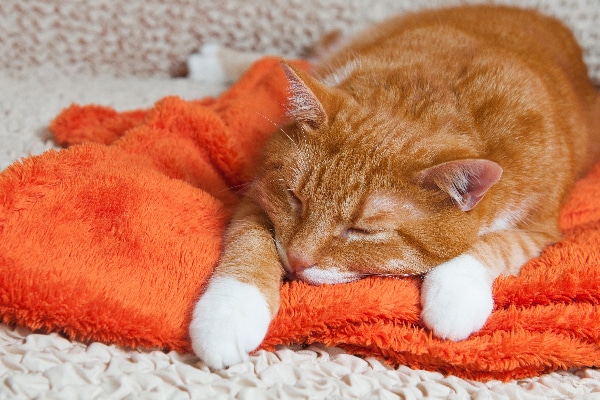We all know heart disease is widespread in humans – in fact, it is the leading cause of death for both men and women. But this chronic condition can affect our feline friends as well. If you think that your kitty may have heart disease, here’s what you need to know about heart disease in cats.
First, What Is Heart Disease in Cats?

Heart disease in cats is a serious medical condition that can affect any part of the heart — the muscle, valves, pericardium or electrical conduction system. The disease is seen in male cats more often than female, though all kitties are potentially at risk. The most common form of heart disease in cats is hypertrophic cardiomyopathy, which affects the heart muscle and causes the walls of the heart to thicken.
In general, heart disease in cats is either congenital — meaning it has been present since birth — or it begins in adulthood, typically in middle-aged to older cats. Adult-onset heart disease in cats results from damage to the heart, which causes atypical function.
What Are the Symptoms of Heart Disease in Cats?
Most cats don’t show symptoms of heart disease until the condition has become severe or advanced. Some signs of heart disease in cats to watch for include decreased appetite, weight loss, lethargy, increased respiration, sudden collapse and temporary paralysis, typically of the hindquarters.
Since these are also symptoms of many other conditions, your kitty needs to see a vet to receive a proper diagnosis. Additionally, stunted growth in kittens can be a sign of congenital heart disease.
What Are the Causes of Heart Disease in Cats?
It can be tough to pinpoint the exact cause of heart disease in cats, but just like with humans, lifestyle factors such as weight, diet and physical activity might play a role. Genetics and secondary diseases are other possible culprits – and in some cases, a serious heart disorder can appear suddenly and without warning after remaining “hidden” for many years. Several breeds are also at greater risk for heart disease than others, including American Shorthair, Maine Coon, Persian, Siamese, Ragdoll and Sphynx cats.
Heartworm in cats is another form of heart disease in cats — and it’s preventable. It’s much rarer than it is in dogs, but unfortunately, heartworm in cats tends to be severe. Protect your cat against heartworms by administering a monthly heartworm preventive.
“The cause of many heart diseases in cats is unknown, but there is likely a heritable component in most cases,” says Abby Faerber, DVM, of State Line Animal Hospital in Leawood, Kan. “Congenital heart disease in cats is present at birth and can be inherited from the parents. Acquired heart disease can result from injury to the heart structures, infections or other concurrent diseases such as hyperthyroidism.”
How Is Heart Disease in Cats Diagnosed?
According to Dr. Faerber, a veterinarian may suspect heart disease in cats if a kitty’s physical examination reveals changes to gum tissue color, vein distension, irregular pulses, high blood pressure and/or irregular heart sounds or rhythms. If abnormalities are found, blood work, radiographs, electrocardiogram and/or echocardiogram are often recommended for diagnosis.
“The most common way to screen for cardiac disease is to auscultate the heart to identify heart murmurs and arrhythmias,” Dr. Faerber says. “However, just because an abnormality is heard doesn’t mean there is underlying cardiac disease. Inversely, just because an abnormality isn’t heard it doesn’t mean there isn’t underlying cardiac disease. It is also important to consider clinical signs and symptoms the cat might have, such as trouble breathing, coughing and/or lethargy.”

What Are the Treatments for Heart Disease in Cats?
There is no cure for heart disease in cats, but your vet can prescribe different medications, such as beta blockers, diuretics or ACE inhibitors, to help your kitty’s heart relax and decrease the likelihood of further damage. If another condition such as hyperthyroidism is present, treating this secondary cause may help lessen the severity of heart disease in cats.
In addition to medication, addressing diet and environmental factors can help cats with heart disease live their best nine lives. Feeding your feline a low-sodium diet can help keep her blood pressure stable, and ensuring kitty has a calm, peaceful place to relax — preferably away from other pets and children — will reduce stress and facilitate healing.
What is the Prognosis for Heart Disease in Cats?
While some cats with severe heart disease deteriorate quickly, in many cases, heart disease in cats can stabilize with effective treatment and the right medication. Especially if heart disease is mild or moderate, a kitty may enjoy many active, happy years after diagnosis, though regular veterinary checkups will be essential to monitor the course of the illness and explore emerging treatment options.
In some cases, you can help stop severe heart disease in cats by keeping annual vet appointments, feeding a high-quality diet and being proactive about pest prevention. But once heart disease in cats has developed, getting a correct diagnosis and veterinary treatment as soon as you notice symptoms can give your cat the best chance at enjoying her remaining years.
Thumbnail: Photography ©infinityyy | iStock / Getty Images Plus.
Read more about cat health and care on Catster.com:
- Can Cats Eat Onions? What to Know About Cats and Onions
- Unlocking Cat Genome Might Help People
- Is Your Cat Peeing on the Bed or Couch? Here’s Why
- 1 First, What Is Heart Disease in Cats?
- 2 What Are the Symptoms of Heart Disease in Cats?
- 3 What Are the Causes of Heart Disease in Cats?
- 4 How Is Heart Disease in Cats Diagnosed?
- 5 What Are the Treatments for Heart Disease in Cats?
- 6 What is the Prognosis for Heart Disease in Cats?
- 7 Read more about cat health and care on Catster.com:





